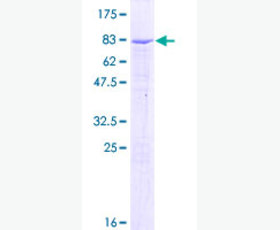Recombinant Human Endothelial Protein C Receptor/EPCR/PROCR/CD201
| Product name: | Recombinant Human Endothelial Protein C Receptor/EPCR/PROCR/CD201 |
| Source: | Human Cells |
| Purity: | Greater than 95% as determined by reducing SDS-PAGE. |
| Buffer Formulation: | Lyophilized from a 0.2 μm filtered solution of 20mM PB, 150mM NaCl, pH 7.2. |
| Applications: | Applications:SDS-PAGE; WB; ELISA; IP. |
| Storage: | Avoid repeated freeze/thaw cycles. Store at 2-8 oC for one month. Aliquot and store at -80 oC for 12 months. |
| UOM: | 100ug/50ug/200ug/1mg/1g |
| Source | Human Cells |
| Description | Recombinant Human Endothelial Protein C Receptor is produced by our Mammalian expression system and the target gene encoding Ser18-Ser210 is expressed with a 6His tag at the C-terminus. |
| Names | Endothelial Protein C Receptor, Activated Protein C Receptor, APC Receptor, Endothelial Cell Protein C Receptor, CD201, PROCR, EPCR |
| Accession # | Q9UNN8 |
| Formulation | Lyophilized from a 0.2 μm filtered solution of 20mM PB, 150mM NaCl, pH 7.2. |
| Shipping |
The product is shipped at ambient temperature. |
| Reconstitution |
Always centrifuge tubes before opening. Do not mix by vortex or pipetting. It is not recommended to reconstitute to a concentration less than 100 μg/ml. Dissolve the lyophilized protein in ddH2O. Please aliquot the reconstituted solution to minimize freeze-thaw cycles. |
| Storage |
Lyophilized protein should be stored at < -20°C, though stable at room temperature for 3 weeks. Reconstituted protein solution can be stored at 4-7°C for 2-7 days. Aliquots of reconstituted samples are stable at < -20°C for 3 months. |
| Purity |
Greater than 95% as determined by reducing SDS-PAGE. |
| Endotoxin | Less than 0.1 ng/µg (1 IEU/µg) as determined by LAL test. |
| Amino Acid Sequence |
SQDASDGLQRLHMLQISYFRDPYHVWYQGNASLGGHLTHVLEGPDTNTTIIQLQPLQEPESWART QSGLQSYLLQFHGLVRLVHQERTLAFPLTIRCFLGCELPPEGSRAHVFFEVAVNGSSFVSFRPER ALWQADTQVTSGVVTFTLQQLNAYNRTRYELREFLEDTCVQYVQKHISAENTKGSQTSRSYTSVD HHHHHH
|
| Background | Endothelial Protein C Receptor (EPCR) is a Vitamin K-dependent Serine Protease that plays a major role in blood coagulation. Binding of Protein C to EPCR leads to the proteolytic activation of PAR1 (Protease-Activated Receptor 1) on endothelial cells and subsequent up-regulation of Protein C-induced genes. EPCR is a type I transmembrane glycoprotein in the CD1/MHC family. It is expressed most strongly in the endothelial cells of arteries and veins in heart and lung. Membrane bound EPCR is released by metalloproteolytic cleavage to generate the soluble receptor. The extracellular domain of human and mouse EPCR shares approximately 61% amino acid sequence homology. EPCR plays an important role in augmenting Protein C activation by the Thrombin-Thrombomodulin complex and in regulating blood coagulation and inflammation. EPCR is found primarily on endothelial cells. Deletion of EPCR function results in embryonic death, at least in part due to placental thrombosis. |














